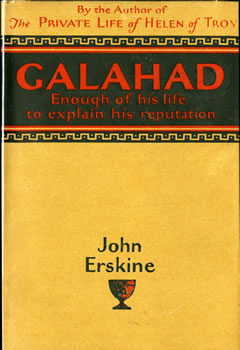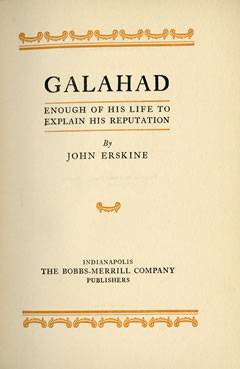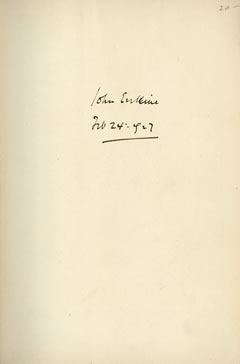Galahad: Enough of His Life to Explain His Reputation
You may click on the thumbnail images to view them full screen

Erskine, John. Galahad: Enough of His Life to Explain His Reputation. Indianapolis: Bobbs-Merrill, 1926. Signed by Erskine.
John Erskine (1879-1951), a professor of English Literature at Columbia University, wrote a novel called Galahad: Enough of His Life to Explain His Reputation, which comments on the role of women in society. Though this novel, like his Tristan and Isolde, takes characters and incidents from Malory's Morte, Erskine deliberately eliminates the legendary elements that he sees as the elaborations of poets and minstrels. Choosing instead to focus on realistic events, he tells 'the story as it happened in our world, to people like ourselves or only a little better.' The people who are most like 'ourselves,' that is, the people of the nineteen-twenties, are the women of the story. Erskine says that 'the plot is composed of three women and one coincidence,' the coincidence being that two of the women who play major roles in the story are named Elaine, the first Elaine of Corbin, the daughter of Pelles, and the second Elaine of Astolat, who plays a relatively minor part in the novel. The third woman is Guinevere.
In the world created by Erskine, there are, as Lancelot tells Galahad, no ladies in distress. Guinevere and the Elaine who gives birth to Galahad are representative of the new woman. A free-thinking and bold-speaking individual, Elaine, who has a respectable suitor, Sir Bromel, deplores the traditional wifely role. When she falls in love with Lancelot, she determines to give him a child although the thought of giving birth out of wedlock shocks Bromel and ultimately makes that very child, Galahad, turn away from her.
 Guinevere is a woman of vision. She describes her marriage to Arthur as one in which her wishes were not consulted, but she married him because she knew that as a woman she 'can't do stirring things' and so wanted to assist Arthur, who she thought would achieve greatness. When she saw him become complacent with what he had accomplished, she turned to Lancelot hoping, she tells Arthur, that he would complete Arthur's work. Too devoted to the king, Lancelot not only shares Arthur's values but also follows him even in matters that Guinevere considers trivial rather than reserving his knightly skills for weightier matters. Her conclusion is that neither Arthur nor Lancelot will achieve the legendary greatness she had hoped for.
Guinevere is a woman of vision. She describes her marriage to Arthur as one in which her wishes were not consulted, but she married him because she knew that as a woman she 'can't do stirring things' and so wanted to assist Arthur, who she thought would achieve greatness. When she saw him become complacent with what he had accomplished, she turned to Lancelot hoping, she tells Arthur, that he would complete Arthur's work. Too devoted to the king, Lancelot not only shares Arthur's values but also follows him even in matters that Guinevere considers trivial rather than reserving his knightly skills for weightier matters. Her conclusion is that neither Arthur nor Lancelot will achieve the legendary greatness she had hoped for.
 In Galahad, Guinevere sees the potential for such greatness, and she takes it upon herself to mold him into the 'masterpiece' that she could not make of Arthur or Lancelot. The content of the masterpiece is to be 'an absolutely new kind of man, an original type.' To create this 'new kind of man,' Guinevere teaches Galahad to resist the charms of women, to fight only in defense of what is right, to 'have some passion or vision' in his life and, when he has chosen 'one dream,' to 'be faithful to that.' The pursuit of this ideal comes at a cost. It requires Galahad to reject anyone who loves him, including his parents and ultimately Guinevere herself. But it is precisely this single-mindedness that makes his reputation. When he disappears from court, people say that he is 'devoting his life . . . to the search for the holiest treasure in the world.' In one sense this is true: the purity he seeks is beyond what is reasonable to expect in the real world and so is worthy of description in the superlative degree. Such talk is also, as Lancelot says, 'how stories grow,' tales like that of the quest for the Holy Grail. The rumor that grew into Galahad's storied success in this quest explains his reputation.
In Galahad, Guinevere sees the potential for such greatness, and she takes it upon herself to mold him into the 'masterpiece' that she could not make of Arthur or Lancelot. The content of the masterpiece is to be 'an absolutely new kind of man, an original type.' To create this 'new kind of man,' Guinevere teaches Galahad to resist the charms of women, to fight only in defense of what is right, to 'have some passion or vision' in his life and, when he has chosen 'one dream,' to 'be faithful to that.' The pursuit of this ideal comes at a cost. It requires Galahad to reject anyone who loves him, including his parents and ultimately Guinevere herself. But it is precisely this single-mindedness that makes his reputation. When he disappears from court, people say that he is 'devoting his life . . . to the search for the holiest treasure in the world.' In one sense this is true: the purity he seeks is beyond what is reasonable to expect in the real world and so is worthy of description in the superlative degree. Such talk is also, as Lancelot says, 'how stories grow,' tales like that of the quest for the Holy Grail. The rumor that grew into Galahad's storied success in this quest explains his reputation.